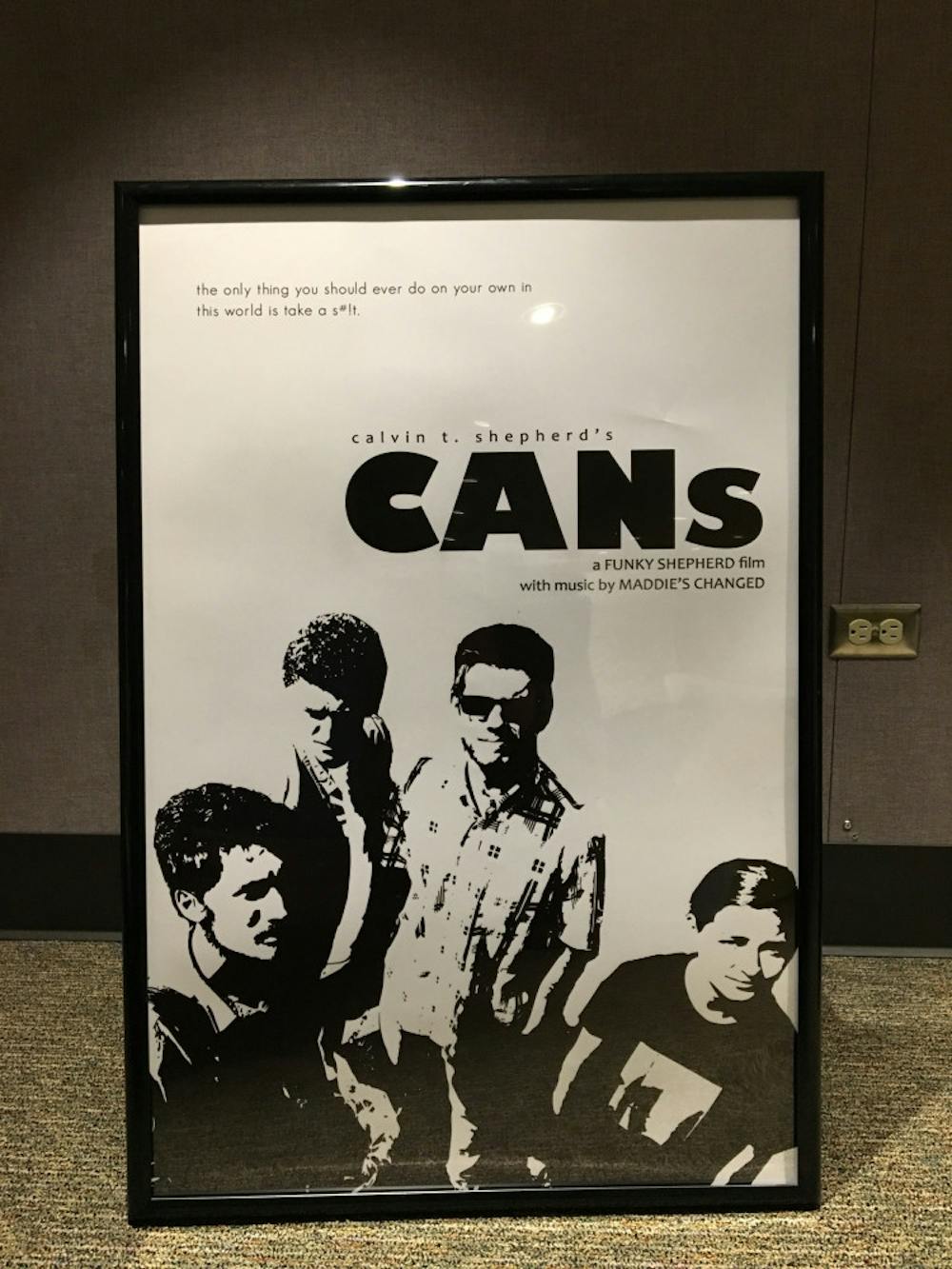Calvin Shepherd, a senior English major, paced back and forth nervously, hands dug deep into the pocket of his slacks. He had dressed to the nines for tonight, and though it was Friday the 13th (in October no less), his luck was holding out. He couldn’t afford any mistakes, because tonight was the biggest night in his career as a young artist: the public screening of “CANs,” the first feature-length film he had ever directed. That night, it opened up to a packed house in the Lindou Auditorium. Shepherd wiped the sweat from his palms onto his slacks and held his breath as the broad projector screen lit up, and the house lights dimmed.
In times of intense stress, Shepherd reverts back to techniques and behaviors he’d learned on the wrestling mat in high school, and that night was one of the most stressful moments of his life.
“I was a wrestler in high school and for the first two years of college, and one of the things we’re taught, in order to get ready for a match, is to keep pacing, to keep our energy up, to keep our bodies moving. I don’t realize that I do it, but in high stress situations, I start doing that,” he said.
Because for Shepherd, this was his everything. He had spent several months filming, 120 hours editing, $100 from his own pocket in production, and just about every last nerve he had left in his body. Like all artists, he wanted to make something legitimate. “CANs” was that something.
The movie, divided up into three parts, tells the story of three friends and their struggles with women. Shepherd described it as being somewhat of a satirical jab at romantic comedies.
What it ended up being was a a 90-minute film that he had written independently, directed by himself, and had labored over in editing right up until show time.
For student artists, the struggles of being young, inexperienced, self-conscious and on tight deadlines are just part of the territory, Shepherd said. He hadn’t even gotten the final soundtrack from local band “Maddie’s Changed” until the night before premiere.
What keeps student artists going in spite of all of these factors, at least according to Shepherd, is finally seeing the audience light up.
For Kathryn Derby, a sophomore psychology major, the feeling of personal validation in creation is something she’s sought after ever since she was young. Derby is the president for “The Crucible,” UNC’s literary magazine. The magazine has gotten submissions from around the globe and publish once per semester, but despite being the president of the magazine, and writing almost obsessively, Derby’s never been in it. In fact, she hasn’t even submitted anything, but she says she wants to.
According to both Derby and Shepherd, it’s easy for one to become self-conscious or critical of his or her own work, and that can paralyze a budding artist.
“I need to feel confident in the piece I’ve written. You’re your own worst critic,” Derby said.
Shepherd added that there’s also more stigma attached to being inexperienced when it comes to putting together a finished product, which is something he experienced with “CANs.”
“I feel like, especially with filmmaking, it’s kind of looked at like ‘that’s not possible.’ I was sitting in there, in the UC, advertising for CANs at a promotional table, and this guy walks by and looks at it [the poster] and laughs. I’m like ‘You know what? Screw you,’” Shepherd said.
The urge to create has been with Shepherd and Derby their whole lives, and for every time they’ve felt appreciated for their work, that urge has grown a little bit stronger. For Derby, it was an innocent moment in her sophomore English class in high school, when the teacher anonymously selected four short stories to read aloud, and have the class vote on which they’d like to hear more of. Derby’s won by a mile.
“I don’t think about that moment all the time, but occasionally I will remember that, and it’s like, well, back then somebody wanted to hear more. Hopefully I’ve improved since then,” Derby said.
It’s a feeling she’s been carrying with her, using to push herself to keep writing and creating. Her next goal, she hopes, is to finally silence her inner critic and submit a piece to the literary magazine.
“It would be sort of a way of proving to myself that what I’m writing isn’t terrible, and that other people like it enough that they would publish it,” she said. “You can’t do an idea justice if you don’t try.”
For Shepherd, that moment of validation came from the premiere of “CANs,” after sweating out all of his anxieties and worries.
“I should have felt comfortable after the first scene, when everybody laughed, but, I couldn’t. I just kept thinking that there would be something that they wouldn’t like,” he said.
Towards the end, despite the uproarious laughter and heavy applause, Shepherd was still all nerves and on the verge of tears. When the audience gave him a standing ovation, he couldn’t even recognize it at first. But the applauses and cheers kept rolling in, and soon the weight of his accomplishment had set in.
Up on the stage, amidst the roar of applause, Shepherd, his cast and crew, took a bow. For him, that night would only be the beginning.
Since the premiere, he’s been editing and tweaking “CANs” so that he can submit it to a few local film festivals. He’s been writing more and more scripts, and planning out a short film called “Hope.”
“I believe in an impossible future,” he said. “I know that when people look at us in this age, and where we’re at now, they don’t believe it’s possible. But I believe that when they look at where we’re at in the future, they’re going to believe it’s possible.”








